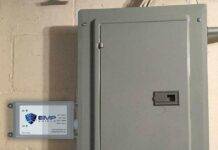
Electromagnetic pulse
An electromagnetic pulse (EMP), also sometimes called a transient electromagnetic disturbance, is a short burst of electromagnetic energy. Such a pulse’s origin may be a natural occurrence like a solar flare or man-made as in the pule derived from a nuclear explosion. The pulse can occur as a radiated, electric, or magnetic field or a conducted electric current, depending on the source.
EMP interference is generally disruptive or damaging to electronic equipment, and at higher energy levels a powerful EMP event such as a lightning strike can damage physical objects such as buildings and aircraft structures. Lightning is unusual in that it typically has a preliminary “leader” discharge of low energy building up to the main pulse, which in turn may be followed at intervals by several smaller bursts. This is the most common type of EMP and can cause significant damage to electrical services and products.
A solar flare is a sudden flash of increased brightness on the Sun, usually observed near its surface and in close proximity to a sunspot group. Powerful flares are often, but not always, accompanied by a coronal mass ejection (CME).

Flares are closely associated with the ejection of plasmas and particles through the Sun’s corona into outer space; flares also copiously emit radio waves. If the ejection is in the direction of the Earth, particles associated with this disturbance can penetrate into the upper atmosphere (the ionosphere) and cause bright auroras, and may even disrupt long range radio communication.
It usually takes days for the solar plasma ejecta to reach Earth. Flares also occur on other stars, where the term stellar flare applies. High-energy particles, which may be relativistic, can arrive almost simultaneously with the electromagnetic radiations.
Nuclear electromagnetic pulse
Weapons have been developed to deliver the damaging effects of high-energy EMP.

A nuclear electromagnetic pulse (commonly abbreviated as nuclear EMP, or NEMP) is a burst of electromagnetic radiation created by a nuclear explosion. The resulting rapidly varying electric and magnetic fields may couple with electrical and electronic systems to produce damaging current and voltage surges. The specific characteristics of a particular nuclear EMP event vary according to a number of factors, the most important of which is the altitude of the detonation.
The term “electromagnetic pulse” generally excludes optical (infrared, visible, ultraviolet) and ionizing (such as X-ray and gamma radiation) ranges. In military terminology, a nuclear warhead detonated tens to hundreds of kilometers above the Earth’s surface is known as a high-altitude electromagnetic pulse (HEMP) device.
Effects of a HEMP device depend on factors including the altitude of the detonation, energy yield, gamma ray output, interactions with the Earth’s magnetic field and electromagnetic shielding of targets.
Like any electromagnetic interference, the threat from EMP is subject to control measures. This is true whether the threat is natural or man-made.
Therefore, most control measures focus on the susceptibility of equipment to EMP effects, and hardening or protecting it from harm. Man-made sources, other than weapons, are also subject to control measures in order to limit the amount of pulse energy emitted.
The discipline of ensuring correct equipment operation in the presence of EMP and other RF threats is known as electromagnetic compatibility (EMC)





















